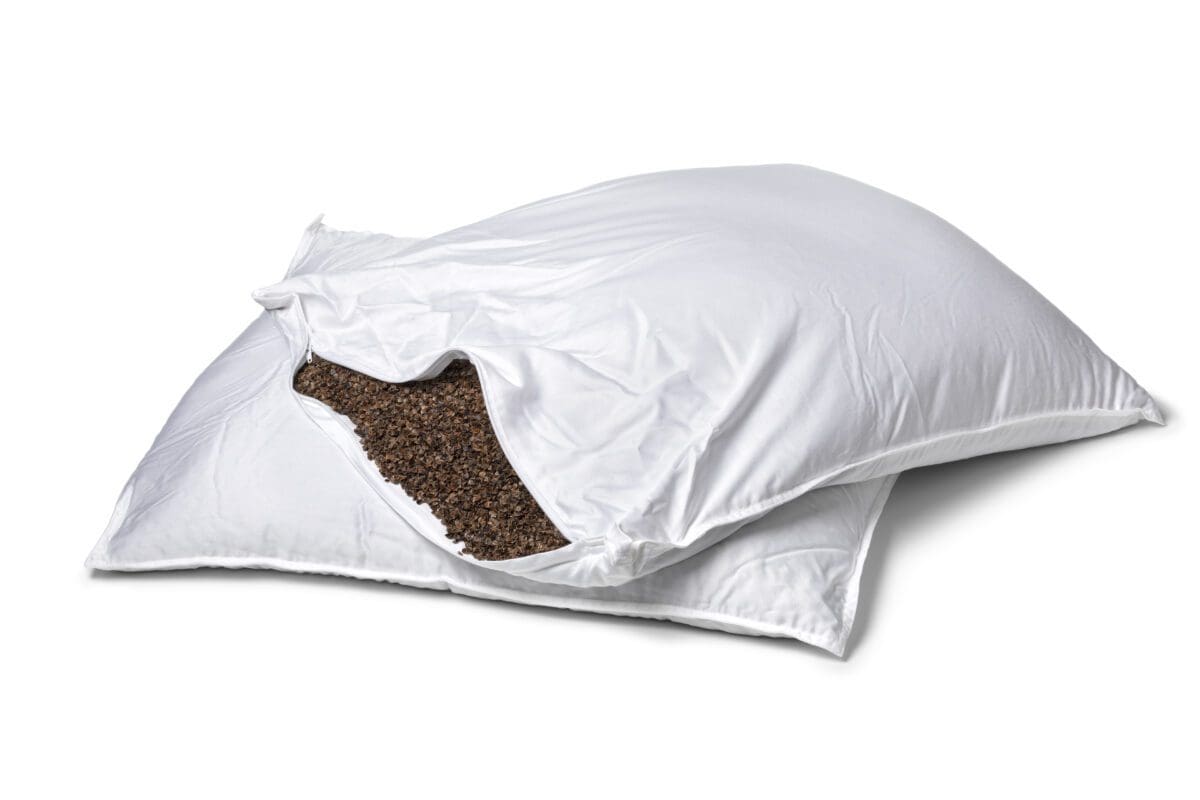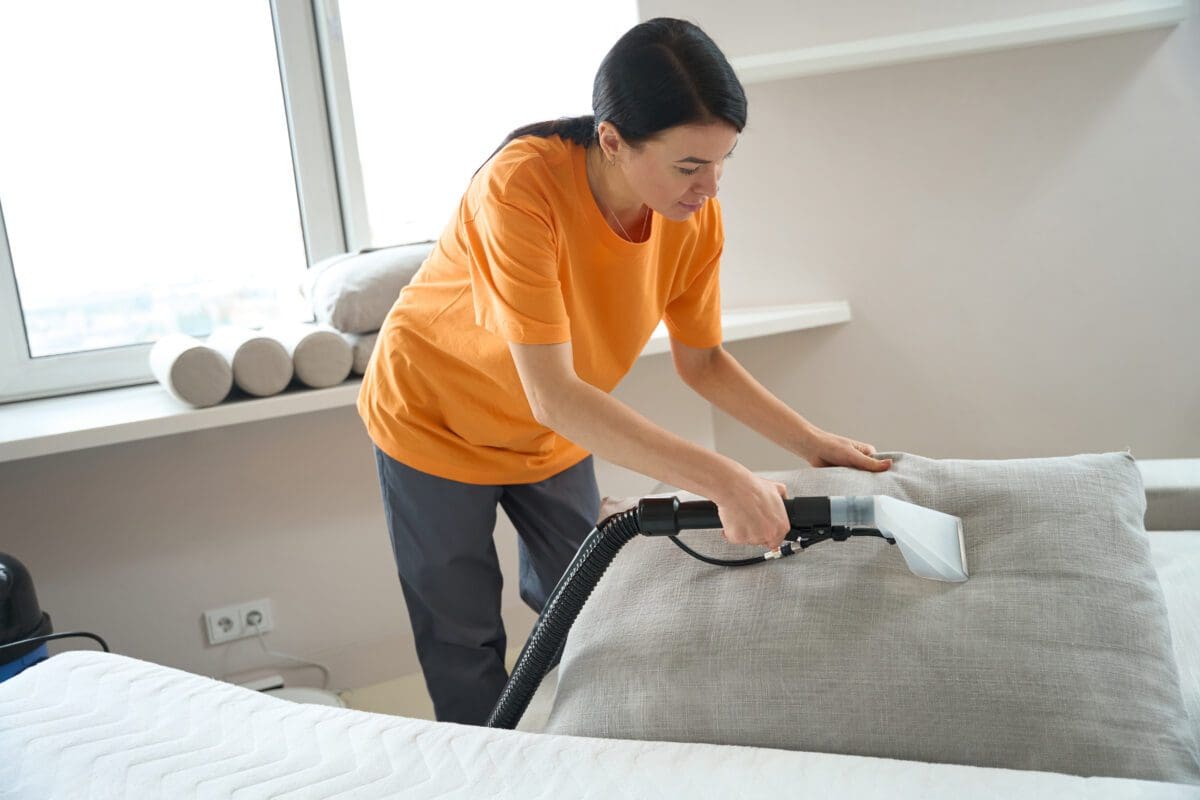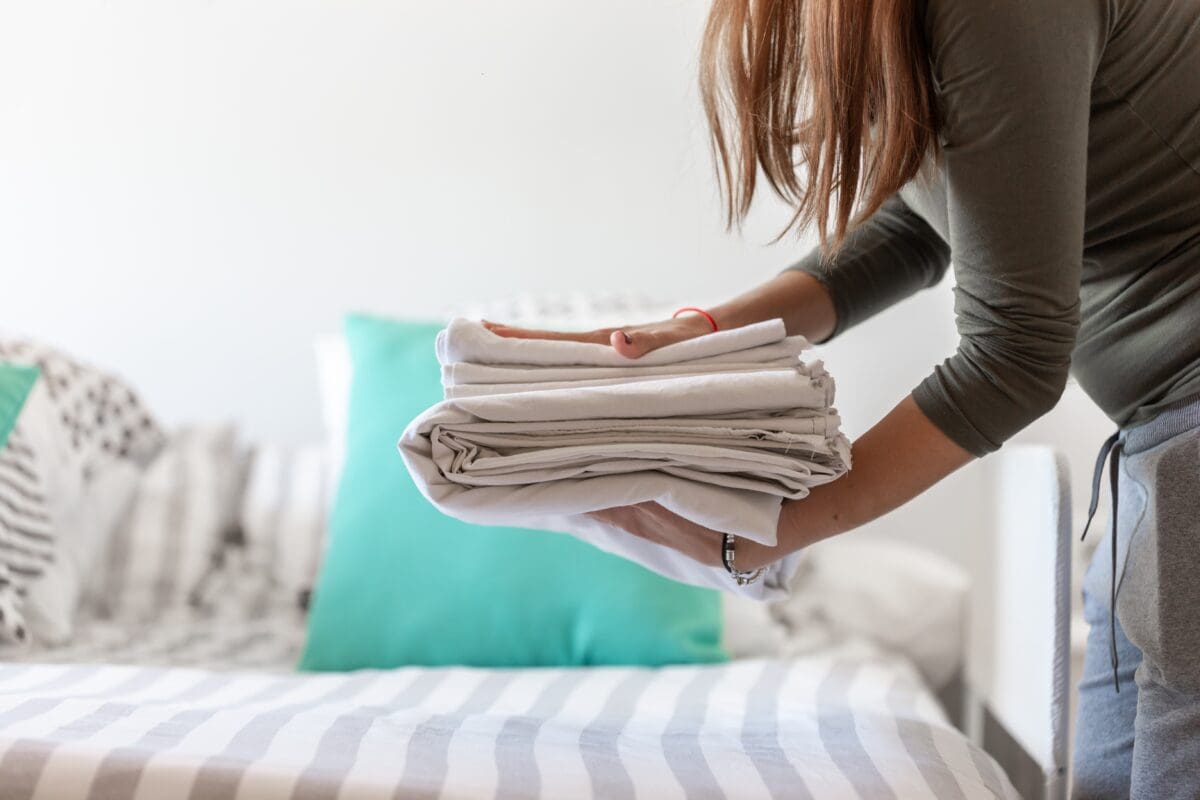At some point, you’ve probably woken up to find random black stains on your once-pristine pillow. The next thing you are probably thinking about is how to get rid of black stains on a pillow after sleeping on them all night?
You might even be wondering, how did these stains get there? And did I sleep on them all night? Eeewww gross!
Have no fear, in this article, we’re going to explore why these stains appear seemingly out of nowhere. We’ll break down the possible causes, such as bed bug infestations and black mold, and what are the remedies.
By the end, you’ll have a clearer picture of what’s going on and some easy steps to prevent and tackle those disgusting black stains you just found on your pillow.

Let’s dive into the real reasons behind those pesky black stains on pillows. There’s more than one culprit.
One of the common causes of those black spots or dark stains on your pillows is none other than a bed bug infestation.
These tiny pests are notorious for leaving behind telltale signs of their presence. If you’ve got black marks on your pillowcase that you can’t explain, it might be bed bug droppings.
These droppings often look like small black spots or stains.
Bed bug bites can cause skin irritation and allergic reactions. Additionally, these pests can disrupt sleep and impact overall well-being.
Swift action against bed bug infestations is essential for preserving a hygienic sleeping environment and preventing potential health issues.
Another sneaky culprit could be mold. Mold spores are everywhere, just waiting for the right conditions to grow into full-blown mold, including that dreaded black mold.
If your pillows are exposed to moisture or humidity, mold can start to grow. Black mold, in particular, is notorious for leaving dark stains, and it’s not just bad for your pillows, it can also be bad for your health.
Black mold on pillowcases isn’t just an eyesore; it can pose health risks. Mold spores released during sleep can lead to allergies, respiratory issues, and skin irritation.
That said, poor indoor air quality due to mold growth affects overall well-being. Addressing mold promptly is vital for a hygienic sleeping environment and to prevent potential health concerns.
Sometimes, the cause of those black stains might be closer to home than you think. If you use hair products like hair dyes or even hair oils, these can transfer onto your pillowcases and leave behind those stubborn dark stains.
If you’re wearing a dark-colored hair bonnet with wet hair, its dye may also leave a dark mark on the pillowcases.
While makeup can help you feel like a million bucks during the day, it might not have the same enthusiasm for your pillowcase. It can be your mascara, eyeliner, or eyeshadow that settles into the fibers. This can make stain removal a bit more challenging.
Your pillow might have black stains for various reasons, whether it’s bed bugs, mold, or transferred dye. Here’s how to start.
Before diving into cleaning, make sure you’ve figured out what’s causing those black stains.
Remember, we’re talking about things like bed bug droppings, mold growth, or even transferred hair product residues. Identifying the source will help you choose the right approach.
To start, gently blot the stained area with a clean cloth or paper towel to remove any excess residue.
For bed bug droppings or hair product stains, you can create a simple cleaning solution by mixing warm water with mild detergent. Dab this mixture onto the stain and let it sit for a few minutes.
Using a soft-bristle brush or an old toothbrush, gently scrub the stained area in a circular motion.
Be careful not to scrub too hard, as you don’t want to damage the fabric. For mold stains, you might want to use a mixture of equal parts water and white vinegar for a natural cleaning solution.
After scrubbing, rinse the pillowcase thoroughly with cold water to remove the cleaning solution. Check the stain – if it’s still there, don’t give up.
Repeat the pre-treating and scrubbing process until you see improvement.
This one is key!!! Sunlight can work wonders on stains. After rinsing, hang the pillowcase outside in direct sunlight. Yes, just like your grandma used to do waaaaay back in the day. It still works.
The natural UV rays can help to bleach out the stains and eliminate any lingering odors. In addition, sunlight is highly effective at killing black mold.
Just be sure not to leave it out for too long, as excessive sunlight exposure can also damage the fabric and fade the colors.

Once you’ve pre-treated and rinsed, toss the pillowcase into the washing machine. Use the appropriate cycle and water temperature for the fabric.
You can add a bit of baking soda or oxygen-based bleach to the wash for an extra boost in stain removal.
After the wash, opt for a gentle cycle in the dryer or air-dry the pillowcase to avoid shrinking or damaging the fabric.
If you’ve identified black mold as the prime culprit of your black stain pillowcase predicament, here are some specialized tips to help you.
Mold isn’t the best companion for your lungs, so don’t forget a mask to keep yourself safe while cleaning.
If the mold is only on the pillowcase, isolate it from other fabrics to prevent spreading. Take it outside to brush off the loose spores – do this gently to avoid releasing spores into your surroundings.
Fill the detergent compartment with white vinegar instead of detergent. Vinegar can help kill mold spores and eliminate the musty smell.
After the wash cycle, run another rinse cycle without adding anything. This helps to make sure all traces of mold and vinegar are gone.
The sun’s UV rays are mold’s worst enemy. Hang the pillowcase outside in direct sunlight. Sunlight helps to naturally kill remaining mold and eliminate odors.
Once the pillowcase is mold-free, opt for air drying. Mold loves damp environments, so dry the pillowcase thoroughly to prevent a comeback.
Here’s how to prevent those pesky stains from making a comeback on your precious white sheets.
Knowing what stain you’re working with allows you to take a more effective preventive response against them. For instance, a yellow stain may result from skincare product transfer or sweat.
In turn, familiarize yourself with the common types of stains that can hit your sheets. Whether it’s makeup smudges, spilled coffee, or those dreaded bed bug droppings, being aware helps you take quick action.
Stick to a regular washing routine for your sheets. Aim to wash them every one to two weeks, depending on your usage.
This prevents stains from settling in and becoming a real headache.

When washing your sheets, consider using hot water if the fabric allows it. It helps to dissolve oils and break down stubborn grime.
Pair it up with a good-quality laundry detergent, one that’s designed to treat stubborn dark spots and stains.
One common sign of bed bugs is those telltale black spots on your sheets, often found near the seams.
So, when you’re changing your sheets, give them a once-over for any unexpected guests or their droppings. Early detection can save you a lot of trouble down the road.
If you ever spot signs of bed bugs, like those black spots on your sheets, take action right away. Bed bug infestations can get out of control quickly, and you want to avoid that at all costs.
If you spot a stain, don’t wait. Tackle it right away. Blot the stain gently to remove any excess, then follow up with a stain remover or a mix of water and laundry detergent. Waiting just gives the stain more time to set in.
Invest in pillow protectors for an extra layer of defense. These nifty covers can prevent sweat, drool, and oils from seeping into your pillows and causing stains.
When it’s laundry day, don’t cram your washing machine. Overloading can prevent proper cleansing and rinsing, making it harder to get rid of stains effectively.
Whenever possible, opt for air drying your sheets. The sun can work its magic on stains and help keep your white sheets looking pristine.
From sweat and body oils to makeup mishaps, fungal friends, and even the possibility of bed bug traces, we’ve covered a range of potential troublemakers.
Regular pillowcase cleaning, proper hygiene practices, washing machine cycles, and keeping an eye out for signs of unwelcome critters will keep those black stains at bay. Now you can sleep easy knowing you won’t be cuddling up to a disgusting pillow any more!